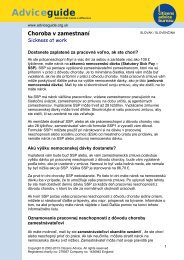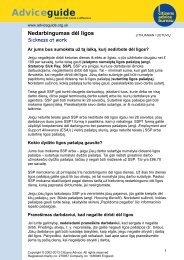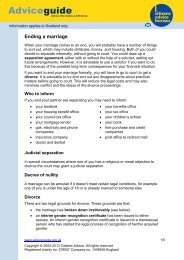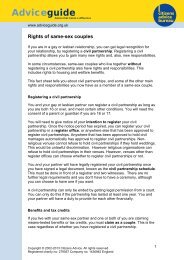Notice of dismissal from work - AdviceGuide
Notice of dismissal from work - AdviceGuide
Notice of dismissal from work - AdviceGuide
Create successful ePaper yourself
Turn your PDF publications into a flip-book with our unique Google optimized e-Paper software.
Adviceguide<br />
Advice that makes a difference<br />
www.adviceguide.org.uk<br />
<strong>Notice</strong> <strong>of</strong> <strong>dismissal</strong> <strong>from</strong> <strong>work</strong><br />
Should you get notice if you're dismissed <strong>from</strong> your job?<br />
If you're dismissed <strong>from</strong> your job, you will usually have the right to a period <strong>of</strong><br />
notice. This is the length <strong>of</strong> time between being told you have to leave your<br />
job and the day that you actually leave (the date <strong>of</strong> your <strong>dismissal</strong>). This rule<br />
doesn't apply if you've been dismissed for gross misconduct. Gross<br />
misconduct includes things like stealing <strong>from</strong> your employer or being drunk or<br />
violent at <strong>work</strong>.<br />
Some people don't have a right to a minimum period <strong>of</strong> notice. They are<br />
people who have <strong>work</strong>ed for an employer for less than a month, civil servants<br />
and some seamen. These people have to rely on their contract <strong>of</strong> employment<br />
for notice, but even if their contracts don't mention notice, they still have the<br />
right to 'reasonable notice'.<br />
If you're dismissed <strong>from</strong> your job without notice, you should get help <strong>from</strong> an<br />
experienced adviser straight away (see under heading Further help).<br />
How much notice should you get<br />
The legal minimum period <strong>of</strong> notice you should get is:<br />
<br />
<br />
<br />
one week, if you've <strong>work</strong>ed for your employer for one month but less<br />
than two years<br />
two weeks, if you've <strong>work</strong>ed for your employer for two whole years<br />
two weeks plus an extra week for each full year’s employment over two<br />
years. For example, if you've <strong>work</strong>ed for three and a half years, you<br />
have the right to three weeks' notice. You can have a maximum <strong>of</strong><br />
twelve weeks' notice in total.<br />
You should never get less notice than the legal minimum, but your contract <strong>of</strong><br />
employment might give you more notice than the legal minimum.<br />
How should you get your notice?<br />
In most cases, if your employer wants to dismiss you, they should follow<br />
proper legal <strong>dismissal</strong> procedures. They should send you a written statement,<br />
telling you why they want to dismiss you. They should also hold a meeting<br />
with you to discuss the matter and hold an appeal meeting with you, if you<br />
appeal against their decision. They must make it clear to you when the<br />
<strong>dismissal</strong> is to take place, and therefore how much notice they are giving you.<br />
Copyright © 2002-2011 Citizens Advice. All rights reserved<br />
Registered charity no: 279057 Company no: 1436945 England<br />
1
Adviceguide<br />
Advice that makes a difference<br />
www.adviceguide.org.uk<br />
Pay in lieu <strong>of</strong> notice<br />
If your employer has dismissed you without giving you the correct notice, you<br />
may be <strong>of</strong>fered pay for this notice period instead. This is known as pay in lieu<br />
<strong>of</strong> notice or severance pay. You should get pay in lieu for the same number <strong>of</strong><br />
weeks as your notice period at the rate <strong>of</strong> your normal wages. If your contract<br />
allows your employer to pay you instead <strong>of</strong> making you <strong>work</strong> out your notice,<br />
that pay will be liable to tax and national insurance. If it doesn't, then tax or<br />
national insurance shouldn't be deducted <strong>from</strong> your pay in lieu <strong>of</strong> notice.<br />
If the amount <strong>of</strong> pay in lieu is correct, you can't force your employer to let you<br />
<strong>work</strong> the period <strong>of</strong> notice instead <strong>of</strong> getting pay in lieu.<br />
If your employer doesn't give you the right amount <strong>of</strong> pay in lieu <strong>of</strong> notice, you<br />
may be able to go to an employment tribunal for wrongful <strong>dismissal</strong>. Before<br />
you do this, you should complain to your employer first. This is called raising<br />
a grievance. If you need help to do this, get advice <strong>from</strong> an experienced<br />
employment adviser.<br />
What can you do if you're not given the right amount <strong>of</strong> notice<br />
If you've been dismissed without the right amount <strong>of</strong> notice and haven't been<br />
<strong>of</strong>fered pay instead <strong>of</strong> notice, pay in lieu <strong>of</strong> notice, you may want to make a<br />
claim for breach <strong>of</strong> contract or wrongful <strong>dismissal</strong> to an employment tribunal.<br />
You should raise a grievance first. If you need help to do this, get advice <strong>from</strong><br />
an experienced employment adviser.<br />
Terms and conditions during your notice period<br />
During the notice period, your normal terms and conditions <strong>of</strong> <strong>work</strong> apply.<br />
Pay<br />
In most cases, if you <strong>work</strong> your usual hours, you should be paid your normal<br />
weekly or monthly wage during your notice period.<br />
If your pay is made up according to how much piece <strong>work</strong> you have done, or if<br />
you earn commission-only pay, you should get an average <strong>of</strong> your usual pay.<br />
You still have the right to your normal wage during your notice period if:<br />
<br />
<br />
<br />
<br />
<br />
there is no <strong>work</strong> available for you to do<br />
you're <strong>of</strong>f sick<br />
you're on holiday<br />
you're <strong>of</strong>f <strong>work</strong> because <strong>of</strong> pregnancy or childbirth<br />
you're on paternity, parental or adoption leave.<br />
Copyright © 2002-2011 Citizens Advice. All rights reserved<br />
Registered charity no: 279057 Company no: 1436945 England<br />
2
Adviceguide<br />
Advice that makes a difference<br />
www.adviceguide.org.uk<br />
If your employer doesn't give you your correct pay during your notice period<br />
this is an unlawful deduction <strong>of</strong> your wages. You can make a claim to an<br />
employment tribunal to get your correct notice pay paid.<br />
Holidays<br />
If you're entitled to holidays and your employer agrees, you can take them<br />
during your notice period.<br />
Sick pay<br />
If your contract <strong>of</strong> employment gives you at least one week's notice more than<br />
the legal minimum, your right to any pay if you’re <strong>of</strong>f sick during the notice<br />
period depends on what your contract says. If your contract <strong>of</strong> employment<br />
gives you the right to a notice period that is the same as or less than the legal<br />
minimum, you should be paid your usual wage during the notice period.<br />
Maternity leave and notice<br />
If you've been on maternity leave, you have the right to return to <strong>work</strong> when<br />
your maternity leave comes to an end. If your employer gives you notice while<br />
you're on maternity leave, you may be able to make a claim to an employment<br />
tribunal for unfair <strong>dismissal</strong> for maternity discrimination or sex discrimination<br />
or possibly both. You should raise a grievance first. If you need help to do this,<br />
get advice <strong>from</strong> an experienced employment adviser.<br />
Fixed-term contracts and early notice<br />
If you are on a fixed-term contract, you may have either a contract which has<br />
start and end dates, or a contract which runs for the length <strong>of</strong> time it takes to<br />
complete a particular task.<br />
If you have a contract that has start and end dates, this means that your job<br />
will end on the date your contract says. You will not get any extra notice <strong>of</strong><br />
when the contract runs out. Your contract may say that your employer is<br />
allowed to end the contract earlier than this date. If it does, this is called an<br />
early termination clause. If this is the case, the usual rules about notice<br />
periods apply. For example, you have the right to one week's notice if you've<br />
<strong>work</strong>ed for your employer for one month but less than two years. Your<br />
contract may give you the right to more notice than this.<br />
If you're on a contract which runs for the length <strong>of</strong> a particular task, and the<br />
<strong>work</strong> is expected to last for at least three months, but it ends early, the usual<br />
rules apply. For example, you have the right to one week's notice if you've<br />
<strong>work</strong>ed for your employer for one month but less than two years. Your<br />
contract may give you the right to more notice than this.<br />
If your employer wants to end your contract early without your agreement, and<br />
your contract doesn't have an early termination clause, your employer will be<br />
breaking your contract. Your employer may be legally responsible for paying<br />
you all the wages you would have received until the date the contract should<br />
Copyright © 2002-2011 Citizens Advice. All rights reserved<br />
Registered charity no: 279057 Company no: 1436945 England<br />
3
Adviceguide<br />
Advice that makes a difference<br />
www.adviceguide.org.uk<br />
have ended. This is not the case if your employer ended the contract because<br />
<strong>of</strong> your gross misconduct.<br />
If you want to make a claim for breach <strong>of</strong> contract (wrongful <strong>dismissal</strong>),<br />
you have to go to an employment tribunal. You should raise a grievance<br />
against your <strong>dismissal</strong> first. If you need help to do this, get advice <strong>from</strong> an<br />
experienced employment adviser.<br />
Making a claim to an employment tribunal<br />
There's a strict limit for making a claim to an employment tribunal. This is<br />
usually three months minus one day <strong>from</strong> the date when the thing you're<br />
complaining about happened. Get help <strong>from</strong> an experienced employment<br />
adviser to make sure you don't miss this deadline.<br />
Further help<br />
Citizens Advice Bureau<br />
Citizens Advice Bureaux give free, confidential, impartial and independent<br />
advice on a limitless range <strong>of</strong> subjects, including employment rights. They can<br />
also refer you to a more specialist source <strong>of</strong> advice, if needed. To find your<br />
nearest CAB, including those that give advice by e-mail, click on nearest CAB,<br />
or look in your local telephone directory.<br />
Other information on Adviceguide which might help<br />
<br />
<br />
Employer withholds<br />
your pay<br />
Holidays and holiday<br />
pay<br />
Sickness at <strong>work</strong> Maternity rights at<br />
<strong>work</strong><br />
Resolving disputes at <strong>work</strong><br />
This fact sheet is produced by Citizens Advice, an operating name <strong>of</strong> The<br />
National Association <strong>of</strong> Citizens Advice Bureaux. It is intended to provide<br />
general information only and should not be taken as a full statement <strong>of</strong> the law<br />
on the subject. Please also note that the information only applies to England,<br />
Wales and Scotland.<br />
This fact sheet was last updated on 21 November 2011, and is reviewed<br />
regularly. If it is some time since you obtained this fact sheet, please contact<br />
your local Citizens Advice Bureau to check if it is still correct. Or visit our<br />
website - www.adviceguide.org.uk - where you can download an up-to-date<br />
copy.<br />
Copyright © 2002-2011 Citizens Advice. All rights reserved<br />
Registered charity no: 279057 Company no: 1436945 England<br />
4


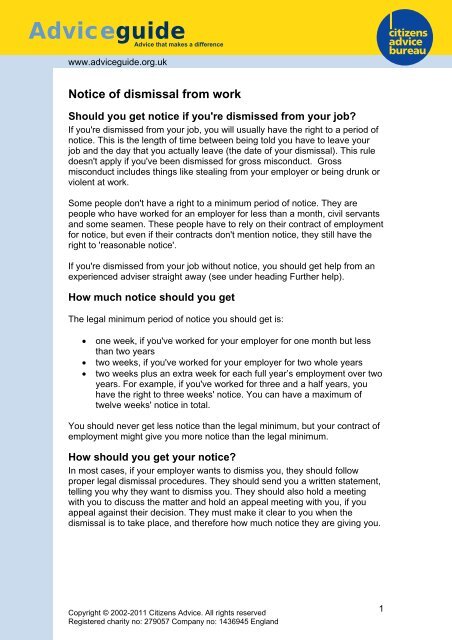
![Sample debt letters [ 33 KB] - AdviceGuide](https://img.yumpu.com/50757075/1/184x260/sample-debt-letters-33-kb-adviceguide.jpg?quality=85)
